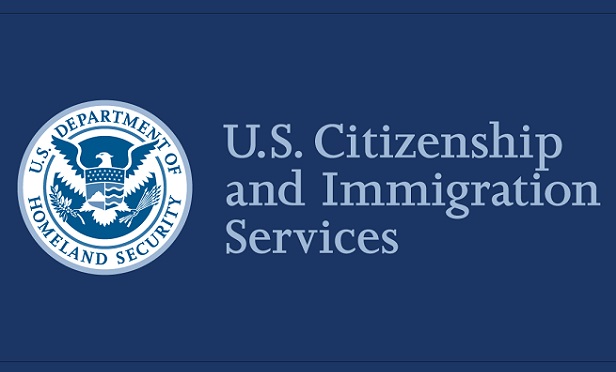 (Even if thenoncitizen clients are in the United States legally, buying healthinsurance without understanding the new regulations could increasethe odds they will be thrown out of the country. Credit:USCIS)
(Even if thenoncitizen clients are in the United States legally, buying healthinsurance without understanding the new regulations could increasethe odds they will be thrown out of the country. Credit:USCIS)
A federal agency has come up with a process for deciding whethernoncitizens are likely to end up depending on government programsto survive.
|The new federal regulations could cause headaches for insuranceagents who advise noncitizen clients about health insurance.
|Even if the noncitizen clients are in the United States legally,buying health insurance without understanding the new regulationscould increase the odds they will be thrown out of the country.
|The U.S. Citizenship and Immigration Services (USCIS) — an armof the U.S. Department of Homeland Security — has includeda number of provisions related to public and private healthinsurance programs in a new final rule on “Inadmissibility onPublic Charge Grounds.”
|Immigration basics
The regulation deals with situations in which noncitizens aretrying to enter the United States.
|The regulation may also affect situations in whichimmigration officials are deciding, for example, whether people whohave U.S. work visas can become legal permanent residents of theUnited States, or whether legal permanent residents can become U.S.citizens. In some cases, rulings may determine whether people havebeen legal residents of the United States can continue to stay inthe country.
|Federal immigration laws already declare that a noncitizen whois likely to become a public charge is inadmissible.
|Officials have been using rough guidelines that have been inplace since 1999 to decide who’s likely to become a publiccharge.
|The new regulations, in general
In the new regulations, and the introduction to the regulations,USCIS officials provide lists of negative factors andpositive factors that officials are supposed to use whenconsidering whether a noncitizen is likely to become apublic charge.
|Officials have decided, for example, to leave benefits forrefugees, use of Head Start preschool programs and use of theSocial Security Disability Insurance (SSDI) benefits out of thepublic charge determination process.
|SSDI, for example, was left out because USCIS officials see theSSDI program as something workers pay for out of their ownearnings.
|The list of negative factors includes use of specified “publicbenefits” programs for more than 12 months within any 36 months.The term “public benefits” includes federal, state and local cashassistance programs; the Supplemental Nutrition Assistance Program;and Medicaid benefits, except when Medicaid is used for certainemergency medical conditions.
|The list of positive factors includes evidence that a noncitizenwill earn a good living, or can depend on financialsupport from relatives.
|The health insurance provisions
The regulation lists having private health insurance as a“heavily weighted positive factor,” in part because USCIShas found that only 6 percent of noncitizenscovered by private health insurance end up depending on publicbenefits programs.
|About 30 percent of noncitizens without private healthinsurance end up depending on public benefits programs, officialssay.
|USCIS officials say they decided to leave use of Affordable CareAct premium tax credits to pay for health coverage through a publicexchange plan off the list of negative factors.
|USCIS left ACA premium tax credits off the list of negativefactors “due to the complexity of assessing the value of thebenefit and the higher income eligibility thresholds associatedwith the benefit, as compared to the eligibility thresholds forother benefits,” officials say in the regulation introduction.
|But officials also left coverage purchased with ACA premium taxcredits off the list of positive factors.
|“Although individuals receiving such benefits have significantlylower odds of concurrently receiving the public benefits designatedin this rule, they receive government subsidies to fulfill a basicliving need, and qualify on a means-tested basis,” officialssay.
|USCIS officials do “not believe it is appropriate to include aheavily weighted positive factor for this type of health insurance,although this type of health insurance would generally beconsidered positively as part of the consideration of the totalityof the alien’s circumstances,” officials say.
|“Private health insurance purchased through an ACA Marketplacewithout such credits will count for purposes of this heavilyweighted positive factor,” officials say.
|The provisions mean that clients who look like healthy goodearners may be able to use ACA premium tax credits for a few monthswithout hurting their ability to become permanent residents orbecome citizens. But noncitizen who already have “negative factors”in their record may want to scrape up the money to buy privatehealth insurance, without using ACA premium tax credits, to get a“heavily weighted positive factor” in their record.
|Timing
The final rule is set to appear in the Federal RegisterWednesday. USCIS officials say that the rule will take effect 60days after the official publication date, but that they will notapply the new factor weighting frameworkretroactively.
|USCIS officials say immigration officials will use the oldweighting rules to assess past use of benefits. Up till now, forexample, officials have often left use of ordinary Medicaid healthbenefits out of public charge determinations, but they have oftenused use of Medicaid to pay for nursing home care as evidence thata noncitizen is a public charge, or likely to become a publiccharge.
|Sources of friction
Many public and private organizations, including publicofficials in California and New York state oppose theregulations. California Attorney General Xavier Becerrahas already put out a statement vowing to fight the newregulations.
|“This vile rule is the Trump administration’s latest attackon families and lower income communities ofcolor,” Becerra said in his statement. “We will not stand idly bywhile this administration targets programs that children andfamilies across our state rely upon. We are ready to take legalaction to protect the rights of all Californians.”
|Court challenges could push back the regulation implementationdate, lead to changes in the regulations, or stop implementation ofthe regulations.
|Resources
A copy of the new USCIS public charge regulation packet isavailable here.
||
Read more:
Complete your profile to continue reading and get FREE access to BenefitsPRO, part of your ALM digital membership.
Your access to unlimited BenefitsPRO content isn’t changing.
Once you are an ALM digital member, you’ll receive:
- Critical BenefitsPRO information including cutting edge post-reform success strategies, access to educational webcasts and videos, resources from industry leaders, and informative Newsletters.
- Exclusive discounts on ALM, BenefitsPRO magazine and BenefitsPRO.com events
- Access to other award-winning ALM websites including ThinkAdvisor.com and Law.com
Already have an account? Sign In
© 2024 ALM Global, LLC, All Rights Reserved. Request academic re-use from www.copyright.com. All other uses, submit a request to [email protected]. For more information visit Asset & Logo Licensing.








